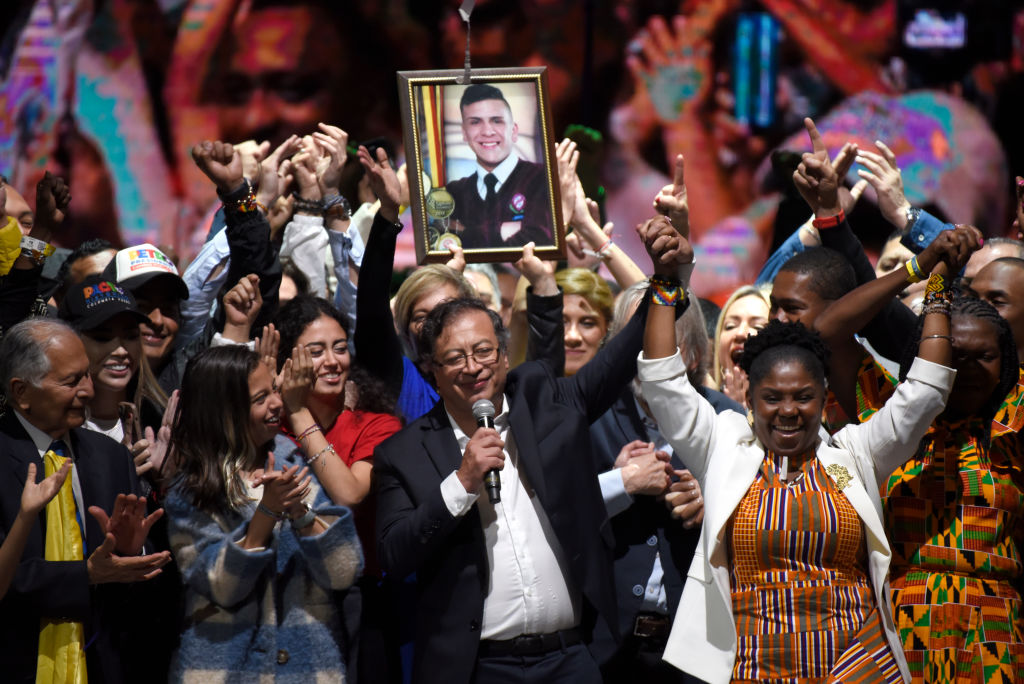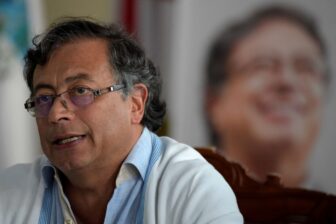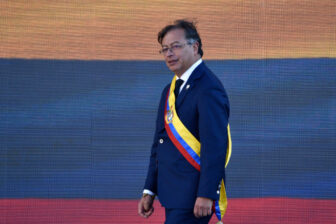With 50.4% of the votes, Gustavo Petro was elected Colombia’s first left-wing president. His running mate, Francia Márquez, also marks the first time an Afro-Colombian woman will take the title of vice president. Runner-up Rodolfo Hernández—with 47.3% of the votes—conceded, saying his acceptance was a necessary gesture “if we want our institutions to stay strong.”
AQ asked observers to share their reaction.
Mauricio Cárdenas, former finance minister of Colombia, senior research scholar at the Center on Global Energy Policy at Columbia University
Petro’s victory was slim, which shows how divided the country is—Colombia is split in two, both geographically and ideologically. Although he started his victory speech in very conciliatory terms, inviting his more bitter opponents to a dialogue, he did not signal specific areas where he thinks a grand national pact can be built. If anyone was expecting a more pragmatic Petro, this is not what you saw on election night. He in fact doubled down on his more ideological messages, while using aspirational terms about justice, or the environment. It was a candidate’s speech, nothing pragmatic or specific, and filled with campaign-like points such as freeing the young arrested during the protests of last year.
Notoriously absent in his first speech as president-elect were: respect for the independence of the central bank and any mention of the importance of fiscal sustainability. He said however that he is NOT planning to expropriate, and that he supports capitalism, not wholeheartedly but as a natural step to end the long history of feudalism and slavery that, in many ways, is still present.
In short, he has not done enough to calm investors, local or foreign and the appointment of the finance minister is more important than ever before. Petro will need to convince people that did not vote for him. However, he is putting his bets on the Gran Acuerdo Nacional, an initiative based on a broad coalition as his priority in order to avoid a negative market response.
About the country’s relation with the United States, he only mentioned an opportunity to collaborate on environmental grounds. With respect to Latin America, the president-elect emphatically expressed his interest in collaborating with other countries in the region on a rapid energy transition.
Petro encouraged the region’s progressives to abandon the notion that social justice was achievable through gains from high oil prices, and instead imagine a “productive and non-extractivist Latin America.” His campaign documents promise a ban on new licenses for oil exploration, a stop to fracking pilot projects and offshore field development, and large-scale open-pit mining. These sectors make up more than half of Colombia’s exports.
The other half of Colombia is now leaderless. Hernández’s vote was consistently an anti-Petro vote, he is not likely to continue as the main opposition to Petro. This election showed that Uribe’s leadership is much weakened as well. What we might see now is a shuffling of people vying to lead the opposition to Petro’s administration.
Right now, Colombia is in stand-by mode.
Silvana Amaya, senior analyst in Control Risks’ Global Risk Analysis practice
Gustavo Petro won the presidency yesterday in a historic victory for the left for the first time in the history of the country. He won by only 3% against his opponent, the anti-establishment businessman Rodolfo Hernández. This means that he will have to respond in a very precise way about exactly how he will govern, considering that more than 10 million people did not vote for him.
In this regard, we are expecting to see some key messages in the next couple of days, and hopefully today he will send a key message by appointing the minister of finance. If he decides to appoint someone more conservative, more orthodox in the macroeconomic stance, he will send not only a message to the markets but to the private sector that his economic policies will not be extremely different, and this will calm the country.
There are some concerns about how exactly he will support all the proposals that he presented during his campaign. His social and economic proposals cost between 60 and 120 trillion pesos, but if he decides to go for a very extreme tax reform, that will only gain about 25 trillion pesos. That means that we still don’t know exactly how he will deliver those proposals and how he will make those social and economic changes that everybody has expected.
Expectations are very high, and people are hoping for substantial changes. If these do not come in the first few months, if people don’t see those quick wins quite fast, they are going to be disappointed, and the social disappointment could be worse than what we have seen in Colombia so far. So maybe we could even expect some social unrest in the next couple of years, maybe not at the very beginning, but later on considering that there are so many expectations that Gustavo Petro should meet.
There are concerns about key reforms like health, pensions and the tax reform, and how aggressive they will be, and how much of his proposals during his campaign he will actually meet. And another factor, surprisingly, is how much he compromised with questionable political sectors, only because of the fact that he made some big alliances and big compromises in order to be elected. We will see how much that will cost him during his term in office.
Tatiana Duque, editor, La Silla Vacía
I believe this is the beginning of a new era in Colombia where the left and the leftist parties are going to rule the country. Negotiations have started with the other centrist parties and politicians with whom Gustavo Petro had tried to get close in recent weeks. The Partido Verde and the Partido Liberal are really important for Petro to increase his coalition in Congress, especially in the Senate, where he only has 39 congresswomen and congressmen from his party, Pacto Histórico. Petro really needs to have at least 14 or 20 new congresswomen and congressmen, so those negotiations may start soon.
President Duque has already spoken to Gustavo Petro and invited him to the Casa de Nariño, so we believe it’s going to be a really peaceful transition.
We are starting to see how big of a change Gustavo Petro is proposing. Today is a holiday, so the markets will not be open, but markets abroad are going to lead the way in how Colombia’s market reacts to this win. We are going to see that on Tuesday, and I really believe that is going to be an indicator of how Petro’s government is being handled abroad.
I also believe that this is a beginning of a new era in Colombia because of the deepening of democracy and the fact that this is the first time that we are going to see a Black woman like Francia Márquez in the vice presidency. Seeing her in the Movistar Arena on Sunday was a really powerful image because of her background. We saw in that arena a new power, a new kind of politician taking over Colombia, in the way it always has to be, through voting and through democracy.
There are a lot of expectations. I don’t know how big the change is going to be, but right now we are seeing, at least symbolically, a different kind of presidency that Petro is proposing to Colombia. He already talked about social justice, a new Colombia, the “politics of love” (which is his catchphrase), so we are going to see how big the change is that he’s proposing and how big the change is that he’s able to do.
Brian Winter, editor-in-chief of Americas Quarterly
A historic day for Colombia as the left won power for the first time, capping decades of strife and horrendous violence in which they were both perpetrator and victim. It feels like a step forward for Colombian democracy to see different visions alternating in power peacefully through the vote.
I spent much of 2021 telling people that Gabriel Boric was above all a committed democrat, and unlikely to try anything truly radical on the economy. I feel much less certain of Gustavo Petro. His economic platform raises many questions, and some statements over the years leave his commitment to independent institutions in doubt. But now it’s time to listen and understand how he plans to govern.
It will be important to see how Colombia’s right and business community react—whether they dig in and refuse to work with Petro at all. Chile is an interesting cautionary tale. During her second presidency (2014-18), Michelle Bachelet proposed many reforms that could have addressed Chilean inequality, but were rejected out of hand by the center and right. After she left office, Chile exploded in the 2019 protests, and the reforms now on the table, including a new constitution, are much more sweeping. Some in the Chilean establishment admit today they should have taken the deal Bachelet was offering. If Petro does pursue a relatively moderate path, Colombia’s establishment may want to consider the long-term costs of refusing to meet him halfway.







